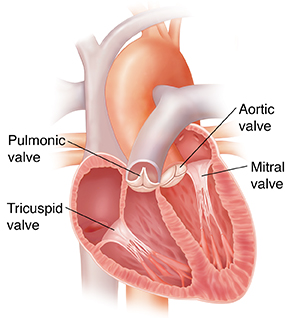Understanding a Heart Murmur
The heart makes sounds as it beats. These sounds occur as the heart valves open to allow blood to flow through the heart and close to prevent a backflow of blood. A heart murmur is an extra noise heard during a heartbeat. The noise is caused when blood flows turbulently through the heart. Heart murmurs can be innocent (harmless) or abnormal (caused by a heart problem).

What causes a heart murmur?
An innocent heart murmur can be a normal finding for many people. It may also be caused by:
-
Fever
-
Exercise
-
Pregnancy
-
Anemia
-
Overactive thyroid gland
An abnormal heart murmur can be caused by heart problems such as:
-
A damaged or diseased valve. The valve may be too narrow for blood to flow through easily. Or it may have problems opening or closing and may leak blood backward.
-
A hole in the heart (septal defect). This is a problem with the heart’s structure that a person is born with (congenital). It causes blood to leak through the wall that normally divides the left and right sides of the heart.
What are the symptoms of a heart murmur?
Heart murmurs don't usually cause symptoms. They tend to be found when your healthcare provider is listening to your heart for another reason. People with an abnormal heart murmur may have symptoms of the problem causing the murmur. Symptoms can include:
-
Feeling weak or tired
-
Shortness of breath, especially with exercise
-
Chest pain
-
Fast, pounding, or skipping heartbeat
-
Swollen ankles, feet, abdomen
-
Feeling dizzy or faint
-
Poor feeding and failing to grow normally (babies only)
How is a heart murmur treated?
An innocent heart murmur doesn't usually need treatment unless there is a clear cause, such as anemia. In such cases, treating the underlying cause should cure the murmur. In some cases, an innocent heart murmur may go away on its own. If a heart murmur is because of something that is causing or could cause problems later, then it may need treatment.
Treatment for an abnormal heart murmur depends on the cause. Options may include:
-
Medicines to help relieve symptoms
-
Procedures or surgery to fix or replace a diseased or damaged heart valve
-
Procedures or surgery to fix a hole in the heart
What are possible complications of a heart murmur?
An innocent heart murmur has no complications. Complications of an abnormal heart murmur will vary depending on the cause. Possible complications include:
-
Heart failure, which means the heart is too weak to pump well
-
Abnormal heart rhythm (arrhythmias)
-
Blood clots and stroke
-
Fainting
-
Heart attack
-
Sudden cardiac arrest (when the heart suddenly stops beating)
When should I call my healthcare provider?
Call your healthcare provider right away if you have any of these:
-
Fever of 100.4°F (38°C) or higher, or as directed by your provider
-
Chills
-
Symptoms that don’t get better with treatment, or symptoms that get worse
-
New symptoms
Call 911
Call 911 if you have any of these:
-
Chest pain
-
Shortness of breath
Online Medical Reviewer:
Callie Tayrien RN MSN
Online Medical Reviewer:
Stacey Wojcik MBA BSN RN
Online Medical Reviewer:
Steven Kang MD
Date Last Reviewed:
4/1/2022
© 2000-2025 The StayWell Company, LLC. All rights reserved. This information is not intended as a substitute for professional medical care. Always follow your healthcare professional's instructions.